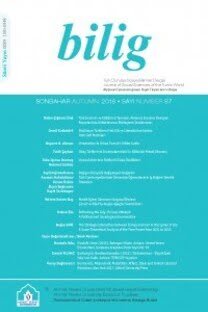15 Temmuz'u Anlamak: Parametreler ve Sonuçlar
Understanding July 15: The Parameters and Results
___
- "Akar'ın Darbeci Emir Subayı: Gülen Mehdi Olarak Kabul Ediliyordu". Posta. 30 Eylül 2016.
- Alkan, Haluk (2016) (Ed.). Latin Amerika Siyaseti Geçiş Sürecinde Başkanlık Sistemleri. Ankara: SDE Yay.
- Alkan, Haluk ve Muhammet Hüseyin Mercan (2013). "Yeni Burjuvazi, Ekonomik Kalkınma ve Afrika: Tuskon Afrika Ticaret Köprüleri". Marmara Üniversitesi Siyasal Bilimler Dergisi 1/1: 25-41.
- Andrew J, Goodpaster and Samuel P. Huntington (1977). Civil-Military Relations. Washington D.C: University of Nebraska Press.
- Aydın, Suavi ve Yüksel Taşkın (2015). 1960'tan Günümüze Türkiye Tarihi. İstanbul: İletişim Yay.
- Bar'el, Zvi (2016). "The Failure of Turkey's Coup: Now It's the Omnipotent Erdogan's Turn for a Revolution". Haaretz. 16 Temmuz. http://www. haaretz.com/middle-east-news/turkey/.premium-1.731359 [Erişim 01.10.2016].
- Coşkun, Ali (2001). "Osmanlı Dönemi Dini Kurtuluş Hareketlerinin Sosyolojisi". M.Ü. İlahiyat Fakültesi Dergisi 20: 115-143.
- Dakika Dakika FETÖ'nün Darbe Girşimi (2016). Ankara: Anadolu Ajansı 2016.
- "Erdogan's Revenge". Economist. 23 Temmuz 2016. http://www.economist. com/news/leaders/21702465-turkeys-president-destroying- democracy-turks-risked-their-lives [Erişim 01.10.2016].
- Fığlalı, Ethem R. (1981). "Mesih ve Mehdi İnancı Üzerine". AÜİFD XXV: 179-214.
- Gaub, Florence (2016). Military Coups: a very Short Introduction. European Union Institute for Security Studies (EUISS). (doi:10.2815/730006).
- Gumbel, Peter (2008). 'Turkey's Warren Buffett looks West'. Fortune Magazine. 20 Şubat. http://money.cnn.com/2008/02/20/news/ international/gumbel ulusoy.fortune/index.htm [Erişim 28.09.2016].
- Gülen, M. Fethullah (2010). "Mesih Nerede? Mehdi Kim". Mesih Nerede? Mehdi Kim. Ed. Ömer Çetinkaya. İstanbul: Işık Yay. https://books. google.com.tr/books?id=0t4fAwAAQBAJ&pg=PT4&dq=Mehdi+- kim+mesih+nerede&hl=tr&sa=X&redir_esc=y#v=onepage&q=- Mehdi%20kim%20mesih%20nerede&f=false, [Erişim 14.09.2016].
- Heper, Metin (2006). Türkiye'de Devlet Geleneği. Çev. M. Soyarık. İstanbul: Doğu Batı Yay.
- Hodgson, Goodwin. S. (1993). İslamıın Serüveni-II. Çev. A.Eker-M. Bozkurt vd. İstanbul:İz Yay.
- Huntington, Samuel P. (1973). Political Order in Changing Societies. New Haven: Yale University Press.
- İnalcık, Halil (1963). "Atatürk ve Türkiye'nin Modernleşmesi". Belleten XXVII/108: 985-992.
- Kalaycıoğlu, Ersin (2000). "Sivil Toplum ve Neopatrimonyal Siyaset". Global Yerel Eksende Türkiye. Der. E. F. Keyman-A. Y. Sarıbay. İstanbul: Alfa Yay. 119-140.
- Kirişçi, Kemal (2016). "Erdoğan's real opportunity after the failed coup in Turkey". Brookings. 16 Temmuz. https://www.brookings.edu/blog/ order-from-chaos/2016/07/16/erdogans-real-opportunity-after-the- failed-coup-in-turkey/ [Erişim 02.10.2016].
- Mani, Kristina (2010). "Militares Empresarios: Approaches to Studying the Military
- as an Economic Actor". Bulletin of Latin American Research. (doi:10.1111/ j.1470-9856.2010.00445.x)
- Mantzikos, Ioannis (2010). "Why the Islamic Revolution Ended: The Regional Politics of Sudan since 1989". Mediterranean Quarterly 21/3. (doi 10.1215/10474552-2010-015).
- Marshall, Shana (2015). The Egyptian Armed Forces and The Remaking of an Economic Empire. Washington : Carnegie Middle East Center.
- Mektubat (2016) http://www.risaleinur.com.tr/kulliyat/0368.html [Erişim 02.10.2016].
- Sarıbay, A. Yaşar (2000). "Türkiye'de Demokrasi ve Sivil Toplum". Global ve Yerel Eksende Türkiye. Der. E. F. Keyman - A.Y. Sarıbay. İstanbul: Alfa Yay. 99-118.
- Schiff, Rebecca L. (2009). The Military and Domestic Politics: A Concordance Theory of Civil-Military Relations. New York: Routledge.
- Siddiqa-Agha, Ayesha (2003). "Power, Perks, Prestige and Privileges: The Military's Economic Activities in Pakistan". The Military as an Economic Actor. Der. Jörn Brömmelhörster and Wolf-Christian Paes. New York: Palgrave Macmillan. 124-142.
- Tanör, Bülent (2003). Osmanlı - Türk Anayasal Gelişmeleri. İstanbul: YKY.
- Uyar, Mesut ve Edward J. Erickson (2009). A Military History of The Ottomans. CL: Praeger Security International.
- Varol, Ozan O. (2012). "The Democratic Coup d'E´tat". Harvard International Law Journal 53/2: 292-356.
- Yavuz, Yusuf Ş. (2003). "İslam İnancında Mehdi". İslam Ansiklopedisi. C. 28. İstanbul: TDV Yay. 371-374.
- Understanding July 15:
- The Parameters and Results
- ISSN: 1301-0549
- Yayın Aralığı: 4
- Başlangıç: 1996
- Yayıncı: Ahmet Yesevi Üniversitesi Mütevelli Heyet Başkanlığı
The Rethinking of the 15th July Coup Attempt on Bureaucratic Communitarianism in Turkey
The July 15 Failed Coup Attempt and Its Implications for Turkish Foreign Policy
15 Temmuz'u Anlamak: Parametreler ve Sonuçlar
Resilience of the Turkish Financial System to Failed Coup Attempt
Giray Saynur DERMAN, Hande OBA
Why Did People Become Human Shields Against The Coup?
Turkish Professional Military Education and Civilian Control
